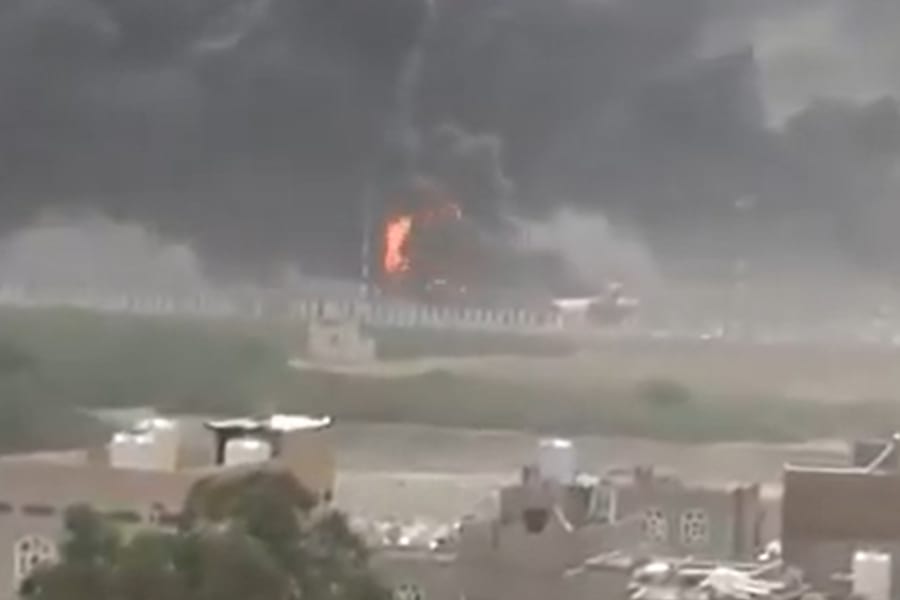Strikes in Yemen, Lebanon & Syria: Israel continues ‘mowing grass’ while waiting for US decisions on Iran, Houthis & Saudi
Israel awaits nuclear talks results , which could point the way to resolving several issues

At the start of last week, the Israeli Air Force struck targets in Yemen, Lebanon, and Syria (plus Gaza) within several hours, once again demonstrating its considerable abilities to strike multiple targets at great distances - a clear message to Iran.
However, the strikes also highlighted questions about the government’s strategic vision.
The strikes in Lebanon and Syria fit neatly into Israel’s old “whack-a-mole” tactics, striking wherever the intelligence services identify a potential threat, while the larger strategy regarding both countries remains unclear.
Whether the overall military operation in Gaza follows a strategic vision has long been a topic of discussion within Israel and is outside the scope of this analysis.
Meanwhile, Israel’s strategy vis-à-vis the Houthi terrorists in faraway Yemen exhibits the clearest signs of a lack of long-term vision – for the moment, they remain nothing but sporadic retaliation that seems doomed to failure, especially in the light of the failure of massive, daily airstrikes by the U.S. and the UK.
However, the threat posed by the Houthis is also the smallest, compared to Hezbollah in Lebanon and a potential Islamist and hostile Syria.
In Lebanon, Israel is back to “mowing the grass,” an expression often used in Hebrew to describe the tedious, daily slog of counterterror work. However, while the military operation last year saw spectacular successes, the weeds are growing back as Hezbollah is slowly restoring its strength.
For the moment, it appears Israel is content striking where it can, while leaving the task of combating Hezbollah to the new Lebanese government.
It is hard to judge Israel’s strategy in this arena, as there is little public information about potential behind-the-scenes contacts with the Lebanese government, which does, however, appear determined to disarm Hezbollah.
There are no reports of possible advancements of the “technical talks” with the Lebanese side, and it appears Israel wants to give Lebanon’s government, and its U.S. and French partners, a chance to weaken Hezbollah.
Whether they can succeed where many others have failed remains to be seen, but the new government shares this interest with Israel and could potentially become a partner in creating security along the border – but peace, or even friendship, is still a long way off.
In Syria, Israel’s stakes could be even higher: A theoretical worst-case scenario of a Taliban-style government allied with a hostile Turkey would be worse for Israel than the Iran-affiliated Assad regime that came before it.
On the other hand, Syria’s new president and former wanted terrorist, Ahmad al-Sharaa, has chosen a different path from the Taliban and seeks recognition and partnership from the West.
He even told a visiting U.S. Representative he could be open to joining the Abraham Accords. At the moment, we can’t know how serious al-Sharaa is about this, but the statements alone will cost him Islamist support.
Until this Sunday, Israel has largely ignored Sharaa’s words, instead focusing on destroying heavy military equipment and maintaining a buffer zone in Syrian territory while pointing to the sectarian killings of Alawites and Druze.
The Israeli Air Force has continued destroying weapons where it can find them, and lately struck several targets, including close to the presidential palace, in strong signals of support for southern Syria’s Druze.
These actions have guaranteed security at the northeastern border and might also have contributed to stopping attacks on the Druze.
However, coupled with Israel’s aggressive diplomatic approach seeking to brand the Syrian government as “terrorists in suits,” they have also isolated Israel from its Western and regional allies – apparently even including the U.S. – who are striving to rehabilitate Syria while distancing it from Russia and Iran and moving it into the Western orbit.
Signaling a shift in tone, potentially upon recognizing the consequences of the previous approach, on May 11, Israel’s foreign minister for the first time declared Israel wants “to have good relations,” and “stability” with Syria.
For Israel, the most serious military threat in the country is not the remaining Islamist militias whom al-Sharaa is struggling to control, but the entry of the Turkish military into the arena.
Here, Israel has begun a process of deconfliction with the Turkish government through Azeri mediation. However, we don’t know what the Israeli government ultimately plans to do about the Sharaa government.
If it continues the current policy, it will maintain security on the border, while paying the price of inflaming the existing anti-Israel sentiments, alienating already-tense relations with regional allies like the UAE and Saudi Arabia, while also risking being dragged into a potential new civil conflict on the side of the Druze.
Looking at the big picture, it seems that Israel’s regional security strategy is currently in a holding pattern, as the Trump administration works toward decisions on a number of issues that will significantly impact Israel.
This includes the Iranian nuclear issue, a potential defense treaty and nuclear cooperation with the Saudis, the ceasefire with the Houthis – and the Gaza War.
Israel will not risk any new conflicts in Lebanon and Syria while the Gaza situation is unresolved, and it appears that only direct action against the Houthis’ Iranian patrons could dissuade them from further attacks on Israel.
Therefore, as ever, the Iranian issue is key. Israel is awaiting the results of the nuclear talks, which will point the way to a diplomatic resolution or military strikes.
Once this issue is resolved, one way or another, the Israeli government might also find the time and resources to come up with new strategic approaches to Lebanon, Syria, and Yemen.
In the meantime, the Air Force continues to whack moles, wherever it can find them.

Hanan Lischinsky has a Master’s degree in Middle East & Israel studies from Heidelberg University in Germany, where he spent part of his childhood and youth. He finished High School in Jerusalem and served in the IDF’s Intelligence Corps. Hanan and his wife live near Jerusalem, and he joined ALL ISRAEL NEWS in August 2023.












